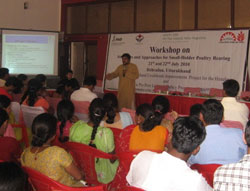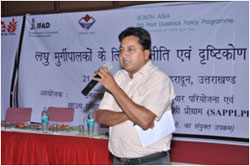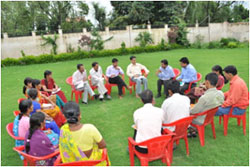Workshop on Strategies and Approaches for Small-holder Poultry Rearing
Aug 23, 2010
The IFAD funded Uttarakhand Livelihood Improvement Project for the Himalayas (ULIPH) convened a state-level workshop on strategies and approaches for small-holder poultry rearing on 21st and 22nd July 2010 in Dehradun, Uttarakhand.
The South Asia Pro-Poor Livestock Policy Programme facilitated the sharing from relevant good practices documented on small holder poultry rearing, and collaborated as a knowledge partner at the two day workshop.
 Participants included staff of the Project Management Unit, field staff from the five district teams (Tehri, Chamoli, Almora, Bageshwar and Uttarkashi), representatives of community federations, mother unit owners and poultry rearers. In addition, ULIPH had invited representatives from the State Bank of India and NABARD to present information on loan and insurance schemes for livestock, and specifically poultry. Good practice owners who participated in this workshop were PRADAN, representatives of the Bastar Integrated Livestock Development Programme (BILDP), BRAC, Bangladesh and Keggfarms.
Participants included staff of the Project Management Unit, field staff from the five district teams (Tehri, Chamoli, Almora, Bageshwar and Uttarkashi), representatives of community federations, mother unit owners and poultry rearers. In addition, ULIPH had invited representatives from the State Bank of India and NABARD to present information on loan and insurance schemes for livestock, and specifically poultry. Good practice owners who participated in this workshop were PRADAN, representatives of the Bastar Integrated Livestock Development Programme (BILDP), BRAC, Bangladesh and Keggfarms.
The workshop was inaugurated by Mr. S.K.Muttoo, Additional Chief Secretary and Commissioner, Forests and Rural Development, Government of Uttarakhand. Mr. Muttoo encouraged participants to take the best possible advantage of the workshop and voice their concerns and the challenges they are facing related to poultry rearing. He stressed that a workshop can be deemed successful only if participants actively contribute to discussions, rather than passively listening to what is being said. He spoke about the importance of recognizing the critical role played by women both within the homes as also in various livelihood occupations, whether it be crop production or livestock development. He informed participants about the unique nature of the ULIPH project, locally referred to as Aajeevika, where support is provided for a range of livelihood activities, and efforts have been made to facilitate the active involvement of the rural community through the creation of community institutions and empowering them to take decisions. Decentralization of decision processes is a critical factor in facilitating community empowerment, and a basic premise of the Aajeevika programme.
 The workshop commenced with presentations by the five district teams on the status of poultry interventions initiated, successes and challenges faced. This was followed by presentations by good practice owners, which included: (i) the community led small holder broiler intervention and the institutional model implemented by PRADAN in Madhya Pradesh and Jharkhand, with poultry rearers organized into district level cooperatives and regional federations; (ii) the development of a cadre of trained village facilitators to strengthen and expand desi poultry rearing, low-cost techniques for poultry rearing, and ethno-veterinary practices documented and promoted by BILDP; (iii) the BRAC Poultry Vaccinators Model under implementation across 19,000 villages in Bangladesh; and (iv) the introduction of the Kuroiler dual purpose poultry bird in villages in West Bengal by Keggfarms.
The workshop commenced with presentations by the five district teams on the status of poultry interventions initiated, successes and challenges faced. This was followed by presentations by good practice owners, which included: (i) the community led small holder broiler intervention and the institutional model implemented by PRADAN in Madhya Pradesh and Jharkhand, with poultry rearers organized into district level cooperatives and regional federations; (ii) the development of a cadre of trained village facilitators to strengthen and expand desi poultry rearing, low-cost techniques for poultry rearing, and ethno-veterinary practices documented and promoted by BILDP; (iii) the BRAC Poultry Vaccinators Model under implementation across 19,000 villages in Bangladesh; and (iv) the introduction of the Kuroiler dual purpose poultry bird in villages in West Bengal by Keggfarms.
The second day of the workshop centered around group discussions related to the implementation strategy for small-holder poultry rearing; systems to facilitate the supply of day-old chicks; the institutional structure to ensure support for feed, vaccinations and market access and possible linkages with the animal husbandry department, and the role of community federations in up-scaling poultry interventions in the region.
 Major recommendations emerging from the group discussions included the constitution of a working group comprising of project staff, federation leaders and experts to assess the status of poultry interventions and advise on future direction; seeking technical inputs for the development of low-cost poultry feed based on crops grown in the area, notably millets; strengthening the knowledge base of mother unit owners through regular training; and facilitating bank linkages for up-scaling poultry rearing interventions.
Major recommendations emerging from the group discussions included the constitution of a working group comprising of project staff, federation leaders and experts to assess the status of poultry interventions and advise on future direction; seeking technical inputs for the development of low-cost poultry feed based on crops grown in the area, notably millets; strengthening the knowledge base of mother unit owners through regular training; and facilitating bank linkages for up-scaling poultry rearing interventions.
Contributed by - SA PPLPP Coordination Team









